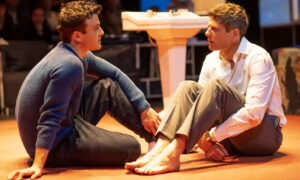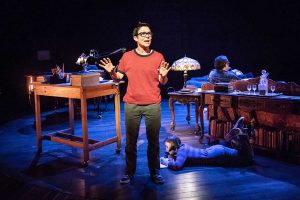James Norton is a terrific choice for the lead role in Ivo van Hove’s production
★★★

Director Ivo van Hove has made quite a bit about the trauma the audience for A Little Life will have to go through when they see A Little Life at the Harold Pinter Theatre or later at the Savoy. There are indeed pints of blood spilt as the central character played by James Norton self harms and attempts suicide. But, to me anyway, this was clearly stage blood, so not that disturbing. I believe the real trauma audiences risk is in their reaction to the detailed descriptions of the physical and sexual and emotional abuse suffered by a child, and the catastrophic effect it has on his adult life.
The little life in question is that of Jude played by James Norton. We see chronological scenes from over twenty years of his adult life starting at 30 years old. Within this narrative are flashbacks to his childhood in which the abuse he has suffered is revealed, up to a point where you may wonder how one person could be so unfortunate. It is probably best to regard the play as a fable about suffering to avoid a reality check.
Although the play is set in New York in modern times, it is deliberately isolated from the historic events and detail of modern life, and we know nothing of the background to Jude’s childhood. This has the effect of making the story more timeless, more universal.
What we learn in the course of the play is not only how child abuse is hugely damaging psychologically as well as physically but also how the love of those in his circle helps him to manage his adult life, and to heal emotionally, at least to some extent. But it is a harrowing journey, in which the past is never far away. His self disgust leads him to self harm and attempt suicide.
Jude’s saviours take the form of his three friends from college who have formed a lifetime bond. Exactly what attracted them to each other is unclear, but I assume it was more than the fact they all pursued careers beginning with ‘a’- artist, architect, actor and attorney, the latter being Jude’s profession. Although he needs them, we find out they need him too.
James Norton, who you may know as Tommy Lee Royce from Happy Valley, is a terrific choice for the lead role. He never changes his appearance from when he is an eight year old to a fifty year old. Yet, through his posture and his body language, he convinces as a child who trusts and is betrayed, and his face as an adult make you feel his pain as well as his indomitable niceness.
The other characters are less well drawn. Luke Thompson as his best friend Willem gives a solid performance, showing love, confusion and desperation in his open face.
The two other friends- JB, an insecure artist JB and Malcolm, an architect with puppy-like enthusiasm- are played by Omari Douglas and Zach Wyatt. His tormentors are all played by Elliot Cowan sometimes oily, sometime vicious, but all unredeemable, unsubtle villains.
Jude’s guardian angel Ana, someone who helped him but sadly died, continues to stay at his shoulder (literally) as a voice in his head encouraging and warning him. Nathalie Armin gives her character strength and warmth. Emilio Doorgasingh plays Jude’s concerned medical friend.
Best of all, Zubin Varla, who has just won an Olivier Award for Tammy Wynette The Musical and who was impressive in Fun Home at the Young Vic, plays his mentor and adoptive father with humour and tenderness.
Tolstoy said in Anna Karenina: “Happy families are all alike; every unhappy family is unhappy in its own way.” And I think this is a clue to one of the failings of this play. The people who help the adult Jude are all nice, but, like happy families, it is difficult to make good, balanced people distinctive and interesting, compared with the unhappy person that is Jude.
Harold addresses the audience directly on a number of occasions to tell us about how to be a good parent, and indeed a good friend. There is quite of bit of exposition in this adaptation of Hanya Yanagihara’s book, almost as if we’re not trusted to draw our own conclusions.
We as an audience are commandeered into being part of Jude’s support group. It is stated explicitly near the end of the play but it is also implied from the start because there are three rows of audience at the back of the stage creating a traverse setting. This has the effect of making the actors closer to the audience, and the audience part of the play. It is as if simply by being there we are bearing witness to Jude’s suffering and giving him the love he needs.

The set, lighting and video are designed by Jan Versweyveld. Most of the stage floor is painted light red like a faded pool of blood. There are some accoutrements of a home, soft seating, a kitchen area on one side, and a washbasin in the centre representing the bathroom that is the scene of Jude’s self harming and suicide attempts.
One thing that fascinated me was the smells: onions cooking, and the strong scent of Dettol used to clean up the spillages of blood- and there was a lot of symbolic cleaning up by those around him. This may have been meant to underline for us how strong Jude’s memories were of the smell of his abusers.
There is music from a live string quartet placed very visibly at the front of stalls. Written by Eric Sleichim, it is slow, piercing and haunting, evoking Jude’s edgy state of mind. The musicians deserve a credit and are Alison Holford, Eleanor Parry-Dickinson, Hazel Correa, and Alison d’Souza.
A video is projected continuously on the side walls. It is mainly in slow motion, as a camera winds its way through the streets of New York, suggesting I think Jude’s enervated mind, but it quickens and is covered in screen noise as Jude gets high on self harming. At one point it goes as red as the blood being shed.
The nudity is about humiliation and vulnerability
You may have heard that there is nudity in this production. The abuse that Jude suffers involves him being forced to strip naked on a number of occasions. This also happens sometimes when he is attempting suicide. So, if you were wondering, far from being erotic or sexy, the nudity is about vulnerability and humiliation. By contrast, when he gets naked for a scene of lovemaking, he remains under the covers, while his lover parades easily in the nude, showing the equality of true love.
When he is stripped naked to be abused, James Norton adopts a hunched pose that reminded me of Masaccio’s renaissance painting of Adam and Eve, who having lost their innocence are expelled from Eden; and when his friends carry him tenderly to a hospital bed after a suicide attempt, another iconic image from religious paintings came to mind, this time by Caravaggio and Michelangelo‘s images of Christ being tenderly carried by those that cared for him from the cross to his tomb. If these Biblical allusions are deliberate, they may help explain a dramatic ending that could be intended to evoke the entombment of Christ.
The production is nearly four hours long. Not that I was bored, but I did wonder whether the effect of the play would have been the same if it had been an hour shorter and therefore the experience more intense, or if there had been less horror-film blood, or if the self harming had been described or mimed- as the sexual abuse is. I say this because by the end I was less shocked than I think I would have been if more had been left to my imagination. But it’s not for a critic to try to rewrite a play, we can only describe what we saw and felt.
I did find some of Ivo van Hove‘s adaptation and production heavy-handed, but there is much to recommend. As a visceral description of child abuse, A Little Life is painful to watch. As a story of the power – and limits – of love, it is moving. And James Norton does give an extraordinary performance.
The italicised sentence at the end of paragraph 2 was added a few hours after the review was posted, for clarification.
A Little Life is performing at the Harold Pinter Theatre until 18 June 2023 and then transfers to the Savoy Theatre until 5 August 2023. Details from https://alittlelifeplay.com/
Paul purchased his ticket to see A Little Life
Click here to watch this review on the YouTube Channel Theatre.Reviews With Paul Seven



